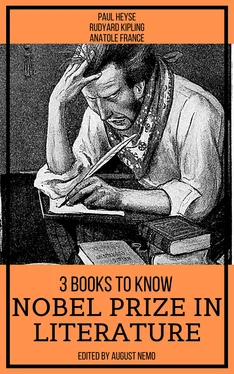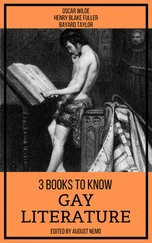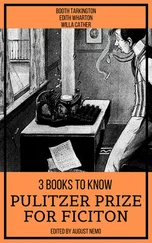He paused again. The friends looked at each other inquiringly.
"If I'm one too many here," said Mohr phlegmatically, rising and seizing the bottle—"I've no objection to drinking this paltry heeltap in your courtyard."
"I have no secrets," muttered the gloomy visitor. "What has happened took place in public; the consequences which still fear the light will soon be noised abroad. A cry of indignation will resound through Germany, when it is known that even now, in the light of the nineteenth century—"
"But, man," interrupted Edwin, "torture has certainly been discarded in the nineteenth century, and yet for the last fifteen minutes you have been applying the thumb-screws of curiosity. Out with it; what has happened, and what consequences still fear the light?"
"Then, if you must know: I was at the workingmen's educational union yesterday—" (Mohr coughed, glanced at Edwin, and then comfortably sipped his wine)—"There was to have been a lecture on the nature and value of education, but the speaker was taken sick and begged to be excused. We were just considering what was to be done, when a new-comer rose, a guest whom no one knew. He had a strange, half humble, half scornful Jesuit face. 'Would the company permit him to make a short address?' The request could not be refused, and he instantly began to speak with a boldness that surpassed everything that could have been expected from his priestly appearance. 'Education? A dangerous thing, at least as the children of the world were accustomed to understand it. The devil, who goes about like a roaring lion, seeking whom he may devour, is a highly cultivated man, not easily caught by modern enlightenment. His proverb is: Education gives liberty, and knowledge rules the world. Yes indeed, the world! So the tempter said to the Lord: "All these things will I give unto thee, if thou wilt fall down and worship me!"—But "my kingdom is not of this world"—and so on, the well known litany—True. education desires to know nothing of the so-called treasures of science, which morth and rust may corrupt. He who is fitting himself for heaven, provides for the one thing that is necessary, the'—well, you're doubtless willing to be spared the sermon. When it was over, the honest fellows sat bewildered and thunderstruck. The old habit, acquired in childhood, still lingered: no debate in church!—and even the president seemed to think we ought not to take issue with a guest. But the man had assailed our society in the most offensive way, and were we to be silent? So I began to speak. I was just in the mood, and besides it's a subject to which I've devoted a great deal of thought, I was glad to give the whole society a full discourse from the text: Disparage only reason and science! Well I need not waste any words on the subject among ourselves. But never has it been so clear to me, as in that hour, what a crime those persons commit, who seek to disgust men with the earth, in order to prepare them for what they call heaven. You know I am the last to favor the current talk about utility. These people make the means the end, and if they achieved their object and arranged the world according to their plan—who that did not consider it the highest aim of life to get his stomach satisfied and know the multiplication table by heart, would wish to live in it? But just because there are higher things—transcendent earthly joys, intellectual pleasures, art, poetry, and all other lofty delights—well, you know what I think, and can imagine how indignation against the foes of all earthly happiness loosened my tongue. The assailer of education and heir of heaven grew red and pale by turns. When I at last paused, and all clapped their hands and burst into a shout of assent, he attempted to reply. But the president would not permit him to utter another word, so he soon slipped quietly away.
"He has enough!" I thought, "but I was not yet satisfied. I meant to go into the next house and write a pamphlet, in which I intended to prove by referring to history, what boundless injury the belief in immortality does the world. And last night I did sit down and write a few sheets, the first outline of the essay; for I was too excited to grasp the subject properly, and one must not shake the retort when anything is going to crystallize. But it seems I'm to have plenty of leisure; for when I went home to dinner to-day, my landlord, the cabinet maker, said that some policemen had been there, had inquired very particularly about me, and had noted down the answer. The man looked as if he wanted to say 'six weeks investigation and then exile.' He's quite right. I know them; they've long kept an eye on me, I made them uneasy, but they could find no cause of arrest. Now the priests will take up the matter, and then good bye! So, as I have no inclination to leave my place vacant, I shall for the present not seek my usual bed, but try once more how it seems to sleep in the open air."
"With your consciousness of being a second Gracchus for a soft pillow!" exclaimed Mohr, pledging him in the glass of wine. "You must live, noble mortal, until the last millionaire is hung with the entrails of the last priest, which will probably occur about the same time as the death of the Wandering Jew."
"Your jeers do not wound me," replied the printer impetuously. "There are people who consider all the great questions that affect the welfare of mankind a mere jest, and never think seriously of anything except their own dear selves."
"And why not, you preacher in the wilderness? Charity begins at home. Until I have taken care of my own dear self, where am I to find time and courage to look after my neighbor, or provide for mankind at large? These things are too weighty, my noble fellow, to be exhausted by the first eloquent pen, and and that's why I wish you a long life, so you can at least be able to study the subject at leisure."
Franzelius cast a compassionate glance at him. "So in all ages selfishness has intrenched itself behind a hypocritical modesty," he grumbled. "If no one wished for or did better things, before he knew the best, we should still be in the condition of the lake-dwellers. And must an idea for which hitherto only our holier instincts speak, I mean which cannot yet be mathematically proved—and with which the world after all would be—for when the smallest thought concerns all mankind—Edwin will know what I mean."
"God understands you, and that's enough; see Sancho Panza at the right place," jeered Mohr.
"What do you intend to do now, Franzel?" interrupted Edwin, who during the whole conversation had been sitting on the window sill, stroking Balder's cat.
"That's a secondary consideration. Tell me instead whether you approve of what I have done?"
"Will that undo it?"
"As if I would recall it! But you know I value the thought, that we three at least—even if others have a different opinion—"
He paused and looked at Edwin almost timidly.
"What I think," replied the latter, "is no secret to you. But I am firmly persuaded of many truths, and yet should hesitate a long time before demonstrating them to a crowd of strangers. However, why should we discuss the matter? You will do what you cannot leave undone, and as you have very enthusiastic ideas about the equality of men, even in their powers of thought—"
"He who does not work for all, works for none, or at least only for himself."
"Pardon me, my dear fellow. That's a false conclusion. You yourself will not deny that the division of labor is a useful arrangement. Well then, one begins from below, another from above. If I convince ten of the best minds, give them even a little light in regard to the hardest problems, does not my work in time aid others also? Mens' gifts are as different as their ambitions."
Franzelius was about to make some reply, but restrained himself with evident effort, and only said:
Читать дальше












